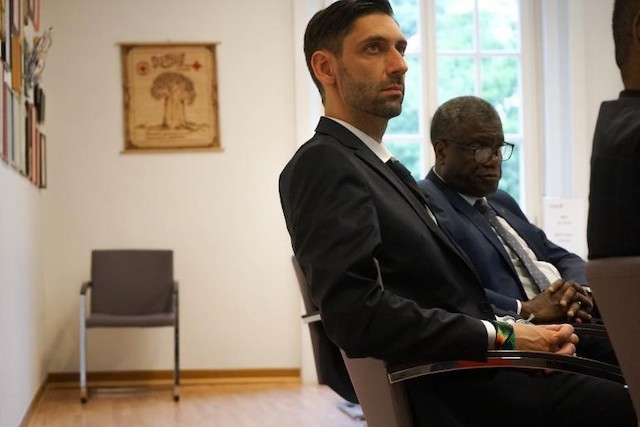In October, Fabbri travelled to the Democratic Republic of Congo (DRC) and met with Nobel Peace Prize-winning humanitarian Dr Denis Mukwege and his team at the Panzi Hospital, which uses a holistic approach to treat survivors of violence, many of whom have been sexually abused.
The meeting not only resulted in providing 42 houses for female victims, but it also gave the teams a chance to catch up on the hospital infrastructure modernisation and extension works. The Luxembourg Red Cross had announced in early 2019 its commitment to the project, supported by the minister of foreign affairs and Lux-Development, and it’s well underway. By 2023, Panzi Hospital will have, among other improvements, modernised central sterilisation, increased capacity in the delivery unit and emergency room, the construction of another 150 homes for victims, as well as two legal clinics.
“What’s in fact important for us is that women who are waiting to be operated on were outside the hospital, and there were huge problems in terms of security,” Fabbri explains. “Now we are trying to see if we can allow them to live inside the hospital while awaiting operations.”
This is also critical because “a woman may need to be operated on 10 times, so it’s a long process. The hospital welcomes around 500 people, when in theory it’s made for 120, so it’s really overburdened.”
And what was it like meeting Dr Mukwege?
“We meet a lot of people who are really good in their domain. Dr Mukwege is very great in many domains, that’s the difference,” Fabbri says. “He’s an incredible humanitarian, he has a powerful charisma, and he has an incredible simplicity...a real gentleman.”
The fact that Dr Mukwege and family have received a series of death threats only further underscores his commitment to his work. Fabbri says the doctor is now living at the hospital, with peacekeepers keeping guard around the clock--truly a man who “gives his life to others, 100 percent.”
Less than 2% of 690m vaccine doses
Much has evolved on the ground in other areas of the Luxembourg Red Cross’ areas of operation as well. Fabbri talks about the oscillating morale for some team members over the course of the pandemic and the pscychological support put in place for them.
They’ve also faced the third wave and, while “conditions aren’t ideal, at least our team continues to be present.” Environmental disasters, such as the September flooding in places like Chad and Burkina-Faso, can further complicate activities.
Fabbri worries that some may have the impression that Africa has somehow been less impacted by other continents--he mentions stories circulating of Africa being used to epidemics, for example--but he personally thinks the number of covid-19 cases is “completely underestimated”, in part due to limited testing.
“We had several cases on our teams where people tested covid-positive, and in the countries where they worked they weren’t able to be retested to be assured they no longer had it,” he explains.
Throughout the course of the health crisis, the on-the-ground teams have also been installing water points for handwashing, providing masks and thermometers, providing health information and more, but now the focus is especially centred around vaccinations.
The World Health Organization announced that less than 2% of 690m vaccine doses administered worldwide as of 8 April had been in Africa--and while 43 countries had received doses, 93% of doses given had been in only 10 countries.
The Luxembourg chapter has already been working to put things in place with other Red Cross chapters and local communities, but “what’s missing are vaccines. We are ready, if the states manage to deliver the vaccines...”
Long-term vs emergency support
In April the Red Cross conducted its annual donations month virtually, and Fabbri says getting such support is critical, especially for longer-term development.
In the case of humanitarian disasters, the organisation has to react fast, sometimes within 24 or 48 hours, and while it does have some funds put aside for emergencies, donations help prop up projects substantially. Equally important, however, is the need for donations to help development over the long-term--projects like Panzi Hospital, for example. For such projects, big donors tend to first want to see the Red Cross commit 20% of its own funds before they’ll, in turn, contribute to get to that 100%.
This year’s month of donations saw “local sections doing wonderful work,” Fabbri admits. “But it’s true, we still need a lot of help today.”
